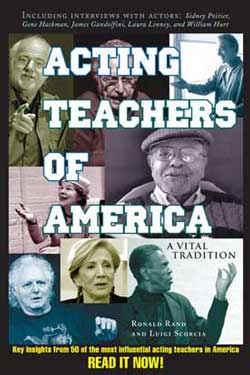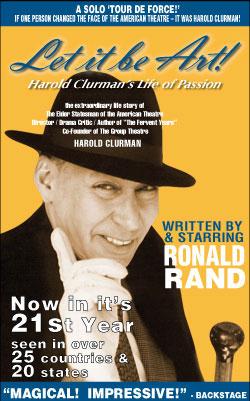Billy Crudup
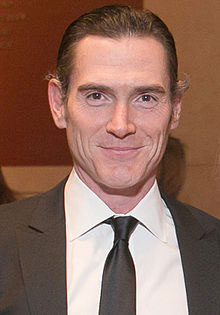 Appeared on Broadway in “The Elephant Man” (Tony nom.), “Three Sisters,” “Arcadia,” “The Pillowman” (Tony nom.), the first two parts of “The Coast of Utopia” (Tony Award), “Waiting for Godot” with Ian McKellan and Patrick Stewart, and “Bus Stop.” Off-Broadway, he was seen in “The Metal Children” and “America Dreaming” (Vineyard Theater) “The Resistible Rise of Arturo Ui” (National Actors Theatre), “Measure for Measure” (NY Shakespeare Public Theatre), and “Oedipus” (Blue Light Theatre Company). Mr. Crudup’s film and television includes Eric MacLeish in “Spotlight,” “Jackie,” “20th Century Women,” “Gypsy” with Noami Watts, “Glass Chin,” “Youth in Oregon,” Russell Hammond in “Almost Famous” (SAG Award nom., MTV Movie Award nom., OFCS Award), “Jesus’ Son” (Paris Film Festival Award), Will Bloom in “Big Fish,” “Ant-Man,” “Charlotte Gray,” “The Stanford Prison Experiment,” “Sleepers” J. Edgar Hoover in “Public Enemies,” “The Hi-Lo Country” (Western Heritage and NBR Awards), “Dedication,” “Watchman,” “Without Limits,” “Inventing the Abbotts,” “The Good Shepard,” “Mission Impossible III,” “The Stanford Prison Experiment,” “Rudderless,” Ridley Scott’s “Alien: Covenant,” “Too Big to Fail,” “Gypsy,” and the voice of Ashitka in “Princess Mononoke.”
Appeared on Broadway in “The Elephant Man” (Tony nom.), “Three Sisters,” “Arcadia,” “The Pillowman” (Tony nom.), the first two parts of “The Coast of Utopia” (Tony Award), “Waiting for Godot” with Ian McKellan and Patrick Stewart, and “Bus Stop.” Off-Broadway, he was seen in “The Metal Children” and “America Dreaming” (Vineyard Theater) “The Resistible Rise of Arturo Ui” (National Actors Theatre), “Measure for Measure” (NY Shakespeare Public Theatre), and “Oedipus” (Blue Light Theatre Company). Mr. Crudup’s film and television includes Eric MacLeish in “Spotlight,” “Jackie,” “20th Century Women,” “Gypsy” with Noami Watts, “Glass Chin,” “Youth in Oregon,” Russell Hammond in “Almost Famous” (SAG Award nom., MTV Movie Award nom., OFCS Award), “Jesus’ Son” (Paris Film Festival Award), Will Bloom in “Big Fish,” “Ant-Man,” “Charlotte Gray,” “The Stanford Prison Experiment,” “Sleepers” J. Edgar Hoover in “Public Enemies,” “The Hi-Lo Country” (Western Heritage and NBR Awards), “Dedication,” “Watchman,” “Without Limits,” “Inventing the Abbotts,” “The Good Shepard,” “Mission Impossible III,” “The Stanford Prison Experiment,” “Rudderless,” Ridley Scott’s “Alien: Covenant,” “Too Big to Fail,” “Gypsy,” and the voice of Ashitka in “Princess Mononoke.”
As you continue creating through the art of acting, what makes it especially rewarding and also challenging being an actor?
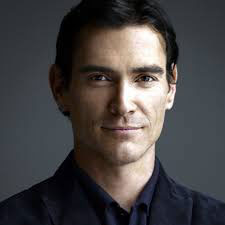 It is a privilege and a meaningful experience to have a chance to find a creative voice in one of the performing arts, with the potential to expand the human experience and the reception of it. I feel extraordinarily grateful. One of the things I realize, as I get older, which is so worthwhile, is the aspect of collaboration and impressing on your creative boundaries of articulating the human experience.
It is a privilege and a meaningful experience to have a chance to find a creative voice in one of the performing arts, with the potential to expand the human experience and the reception of it. I feel extraordinarily grateful. One of the things I realize, as I get older, which is so worthwhile, is the aspect of collaboration and impressing on your creative boundaries of articulating the human experience.
As an actor, I’m most interested in how I interpret the material that’s been created, and I gravitate to these source materials that exceed my own intellect and capacity, at the opportunity to expand my own understanding, my creative limits and my personal growth. And that through that understanding and the experiences you’re going through, you realize you’re occupying different spheres in your life. You go from someone who’s in an entry place, moving to someone with a bit more experience, to someone who has become a veteran from all of their experiences, you become a father, a citizen in the community; you’re becoming a different person. As a performer I feel quite blessed that I’ve been given the opportunity to explore my own incarnations.
Did you know early on that acting would be your life?
No, not at all. I knew I enjoyed doing it, and it certainly felt useful getting girls’ attentions in a social setting. I never thought it was an occupation worth pursuing. No one in my family was in the creative arts. I do remember thinking that it wasn’t on my radar.
In fact, it was one of the main reasons I went to graduate school. I thought by pursuing and getting my Masters, I would be able to teach at a collegiate level. But I had a pretty strong suspicion from the first day there, that becoming a professional actor, it would be necessary to approach it in the most responsible way, that it was most important to take a rigorous approach towards it.
You appear to move comfortably between acting on stage and in front of the camera. Is it a matter of being in control of different muscles or how you focus your energy?
Both of those are aspects of it. Fundamentally, it’s all born out of the same philosophy of addressing the story you’re telling, and the medium. Whether you’re reading a children’s book to your child, or telling a story in a Greek amphitheater, or it’s in a big theater or a small theater, in film or television, the understanding needs to reach those listening coming from the ones who are communicating the story. Those fundamentals I learned at NYU. Acting forces you to continue being a student. As you get older, the fascination is how successful you can be at story-telling.
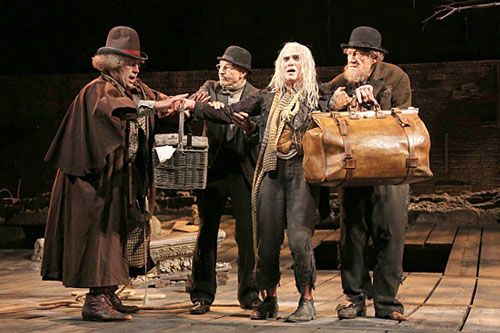
Billy Crudup in “Waiting for Godot” with Shuler Hensley, Sir Ian McKellen and Patrick Stewart
(Sir Ian McKellan website) photo by Joan Marcus
Early on in my professional life I was given very special opportunities, and probably I wasn’t prepared. So I had to guess at an “approach.” People are giving you power which can be scary. So you say to yourself, “I know how to do it in a certain way with what I know.” But it can be inhibiting to one’s early growth. I definitely embraced a particular approach.
How did you prepare to play Lucky in Samuel Beckett’s play, “Waiting for Godot,” and how freeing was it for you once you were inside Beckett’s world working with Ian McKellan, Patrick Stewart, and Shuler Hensely, directed by Sean Mathias on Broadway?”
Firstly, Ian and Patrick and Shuler are “theatre beasts,” they have such incredible instruments and they’re also all singularly-driven artists. They have a combination in ambition, and in working on material like Beckett which makes for a pretty special kind of support and collaboration.
My first time working with Sean (Mathias) was on “Elephant Man.” We had about five to six weeks of rehearsal, and during those first two or three weeks, the rehearsal process was firstly, collaboration, on discovering what the story was about, what theatrical conventions were going to be employed, how the ensemble would play a part in the story-telling. Sean would introduce physical or vocal dynamics into the rehearsals for me to play with.
Between two to three weeks before the tech rehearsal, he said to me, “I want you abandon everything we've done up to now.” Without batting an eye, I said,.”Okay great.” Then he said, “Let’s start now with no physical attributes, no ailments, and lets work on the scenes that way,” and slowly we’d introduce things. I had a great confidence, a great deal of trust in knowing how to work on the process. I came in with no pre-conditions, ready to receive.
With the Lucky, (the character in “Waiting for Godot”), the first time we put it on its feet, I didn’t really know what the experience would be like. As Lucky, I had been carrying the valises for hours, for weeks, for months leading up to that moment to put them down, but you can’t project on to it. And until we actually had the rope which is tied around me for my entrance, you don’t know what will happen. You have to fit into that world.
Sean had a gag, regarding the use of the drumroll from a previous production, of a big crash and I thought it would be a good sight gag for a big lead-in and then someone comes in, pathetically shuffling around on stage. That’s what introduced the fractured movement for Lucky. Sean thought it would be interesting to discover how it could be useful with what was going on inside of him, with his feet, with what condition they are in, with what animal instinct is driving him. The character was a creation of deprivation, of many physical ailments, of his well-being, his monumental drive to survive. Thats how we created the complexity of that movement. Once we began physically working what affect it had on me, I had to do an extensive warmup beforehand. Mercifully, we only did four shows a week since we were in repertory with ‘No Man’s Land.” I gravitated to this kind of work.
Once you’ve agreed to take on a new role in a film, for example, like your roles in the films, “Jackie,” and “Spotlight” - what are the first things you do to get a bead on who your character is, and what you want to bring to the film?
I will ask the director what the story is. I have to become aware of how the director is articulating that story. My question then becomes: “Why me? How can i be useful in the telling of the story?” Film is the director’s medium and I’m going to need to know when the director will stay in a close-up, or move to a long-shot, when he’s not interested in what I'm doing in the scene, or he is. How a director can articulate what parts of the character I’m playing is instrumental in the story will tell me a great deal. It's also subservient to the film editor’s whim. When I can get an idea of how the director thinks then I’ll know how I can be useful.
In a way, it's very much like playing chamber music. You have to know when you need to come, and you have to know how to enter in so it’s not too loud but on key. You find a way into it naturally.
With working with a director like Tom McCarthy, when I first read “Spotlight” and the role I was to play, I became terribly interested in playing this man as an antagonist. However, in the way it was written it seemed uncomplicated.
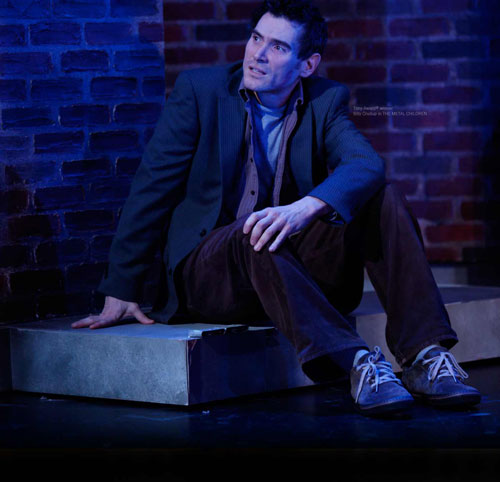
Billy Crudup at The Vineyard Theatre
I’m much more interested in playing people who don’t behave in a way we respect or empathize with. It’s important for me to understand what’s going on in their mind. They may think of themselves as being a good person, as being protective of their own humanity in life, regardless of the cost to other people. It was important for me to understand how Eric, (the character in the film), was written. Because I had to base my character on someone who existed, I had to uncover his motivations for his behavior.
You have a responsibility to uncover the most important things about the person to get across the way he thought. That he felt he was doing the right thing. He was trapped in a system that wouldn’t benefit anyone and he had to do what he was right. He should be a heroic figure but even after the story came out, he was vilified He went on to have what might be characterized as a nervous breakdown.
In an article in 2010, it told of him coming into work and experiencing nausea and he would profusely sweat, so he couldn't go to work. He went into therapy, and it came out that he had been abused as a child, and he recounts what happened in a boarding school, and that he couldn’t shake the trauma of these kids testimony. He thought he was helping them. In the end he falls in love with his therapist. He stops his law practice, and there are all these tentacles of person struggling to do the right thing. This is someone I can begin to find my way into playing as an actor.
That’s my primary way of approaching a film role. In the theatre, you have more time to create. For me, it’s always a collaborative understanding of the story we’re telling.
How have you learned to lessen the “critical” or “judgmental” voice we all carry with us, to be in the moment for an audition or in your meetings with directors?
That’s a great question. One of the primary oppositional forces to people trying to be self-aware is what happens when the self awareness makes you becomes self-conscious. Because of your own self-expectations or what other people will think of you. You have to confront these experiences through a pro-active approach. For me, it’s been one of mindfulness, and mediation has been a huge tool because it’s all about not becoming attached to those thoughts.
if I have an audition, I always bear in the mind that this is my chance to play the part. I give it my best effort and use the tools I have. Of course, there’s not a whole lot that you can do to the outcome. At that moment, your career may not be going as well as you’d like or the casting director doesn’t know you, there could be a million reasons or maybe it’s something you couldn't possibly know about why you may or may not get the role.
Challenging yourself with any kind of self-conscious thoughts can seriously hamstring you. I focus on what I have. I let my mind be busy concentrating on my breath, embrace the opportunity, whatever the circumstances are to keep my feelings off of any self-doubt.
Are there certain things you’ve discovered in the art of collaboration with a director and the cast?
Absolutely. I’m always bearing in mind certain things in the rehearsal process. If I’m in a room of five people and you know you’ll be working together for several weeks, you know the stage manager, the assistant stage manager, you begin to recognize features inherent in the collaboration. You will notice a shift that may turn out to be monumental to the rest of the cast and the play. It usually happens in subtle way over time, as we keep whittling way at the play, and all of a sudden the character comes into view. It’s as if you were taking a sledgehammer to a block of stone, hoping something miraculous would happen. But it happens in a much more subtle way. It’s also very rare that a lot of what you come up with really has a lasting impact.
That being said, all those ideas you keep coming up with during the process are really important because they keep you asking questions. That’s one of the greatest requisites I learned from working with Ron van Lieu at NYU. Questions are one of the actors most profound tools by the time you get to the third week of rehearsals.
It’s during the first day of rehearsal you have all this energy of invention while you’re listening for the first time to the other actors voices. As you continue through the first week, you’re answering questions that are pretty obvious, and your mind goes to certain references, but you’re still working in a superficial way. By week three you're actually getting to the specificity of what you’re doing, leading to the re-creating of a human life.
There was a line in “Oedipus” which I did with Frances McDormand, to the effect: “If I had two thousand years to explain what was going on in my head, I wouldn’t be able to do it.” Its true, there are thousand ways towards specificity. It’s up to the actor to take the time to refine behavior, to keep asking questions. It’s a matter of persistence, to keep coming up with ideas, or watershed ideas that may change the entire tone of the piece, that are fundamental to its outcome.
The momentum of a production has a life of its own. You must continue being inventive, and working with a good director, they’ll give you the opportunity to discover the things that become important to you. But it’s all not just an on-going creative expression, everything always has to be in service to the play.
How do you keep yourself centered?
Rigorous exercise. I have to exercise, and most of the time, handling being a father keeps me both driven and well-centered. It can so hard under any circumstances, but being involved in the community is really important. We’re not telling stories in a vacuum. It’s important to be in the world, to know that you’re going to try to influence, whether to entertain, or to attempt to influence the cultural landscape - to know it’s your responsibility to be engaged with who the audience is that you’re making an influence on.•
























